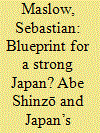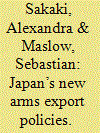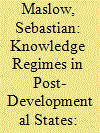| Srl | Item |
| 1 |
ID:
141493


|
|
|
|
|
| Summary/Abstract |
Abe Shinzō has pledged to “take Japan back” from its constraining postwar regime. Redesigned institutions for intelligence and security policy coordination and “proactive pacifism” have facilitated the exercise of collective self-defense and strengthened the US–Japan alliance. The evolving security system is accelerating the dilution of Japan’s pacifist norms.
|
|
|
|
|
|
|
|
|
|
|
|
|
|
|
|
| 2 |
ID:
175660


|
|
|
|
|
| Summary/Abstract |
This article examines the significance of the changes in Japan’s arms export policy following Prime Minister Abe Shinzō’s return to power in 2012—a topic which has so far received insufficient scholarly attention. Established in the 1960s and 1970s, Japan’s ‘virtual’ ban on arms exports was an expression of the country’s postwar anti-militarism. Yet, in keeping with Japan’s increasingly active role in security affairs, Abe lifted the ban on weapons exports in 2014. Within the Ministry of Defense, a new agency was installed to oversee the arms industry and to promote military-related research and weapons transfers. We show that the Abe administration conceives of arms exports and related cooperation as an integral part of its national security strategy. Tokyo not only hopes to improve the competitiveness of its own defence industry, but also seeks to cement existing and new security partnerships while contributing to regional capacity building as a hedge against a rising China. The actual ramifications of this policy change are far from clear yet, however. A major constraint for policymaking is the reluctance of the defence sector to embrace arms export due to the associated business risks including the fear of tarnishing their corporate image.
|
|
|
|
|
|
|
|
|
|
|
|
|
|
|
|
| 3 |
ID:
158499


|
|
|
|
|
| Summary/Abstract |
Tracing the mechanisms of policy change, recent studies of knowledge regimes in Western democracies have examined the reciprocal relationship between a state’s institutional features and the role of think tanks in the production and dissemination of policy ideas. This paper expands the focus to East Asia and examines the role of think tanks in Japan. With a strong bureaucracy functioning as the primary repository for policy expertise, Japan’s developmental state has long been discouraging the creation of independent think tanks. Yet, Japan’s bureaucratic and electoral reforms in the 1990s have opened new access points to the policy process, encouraging the growth of new think tanks in addition to Japan’s semi-governmental and corporate research organizations. By looking at the Abe government’s national security discourse and Japan’s debate on participation in the Trans-Pacific Partnership Agreement during the period 2012 to 2015, this article assesses the role of external policy advice in Japan’s post-developmental state. The study illustrates the link between Japan’s changing political system, the changing nature of its knowledge regime, and the structural conditions under which think tanks yield influence in Japan. By doing so, this article offers evidence of an increasingly competitive think-tank landscape structured along the conservative and progressive political spectrum of policy ideas, and unpacks the strategies by which think tanks penetrate Japan’s policymaking process. However, despite the enhanced role of think tanks, the findings also point to the sustained prominence of individual intellectuals and academics in advising Japan’s decision makers.
|
|
|
|
|
|
|
|
|
|
|
|
|
|
|
|
| 4 |
ID:
179950


|
|
|
|
|
| Summary/Abstract |
President Donald Trump’s “America First” policy questions the fundamentals of the global U.S.-led alliance network. Where other allies implemented hedging strategies, Japan’s Prime Minister Abe Shinzō pledged to “make the alliance even greater,” insisting that the bilateral ties were “airtight” and “stronger than ever before.” However, Trump’s approach to trade, détente with North Korea, and off-the-cuff remarks regarding nuclear weapons invigorated criticism in Japan: the U.S. is an unreliable partner and Japan needs to prepare for life after the alliance. We argue that Abe’s embrace of Trump was successful in staving off the worst, maintaining stability at the cost of personal humiliation and certain trade and security interests. However, Trump’s cavalier treatment of Japan has laid bare the realities of the alliance, potentially revitalizing a more autonomous discourse of alternatives to the current and often “humiliating” modus in alliance management.
|
|
|
|
|
|
|
|
|
|
|
|
|
|
|
|